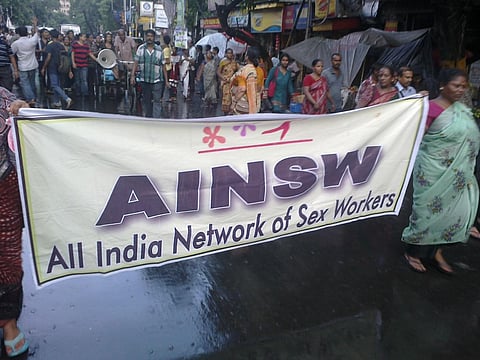

NEW DELHI: Days after the Supreme Court decided to replace the term ‘sex worker’ in its handbook on gender stereotypes, more than one-and-a-half lakh sex workers submitted a memorandum to Chief Justice of India Chandrachud, urging that the proposed move will be detrimental to the rights and hard-won dignity of sex workers.
After receiving suggestions from a group of anti-trafficking NGOs that the term ‘sex worker’ promotes gender stereotypes, the SC on November 10 said that it will amend the term to ‘trafficked victim/survivor or woman engaged in commercial sexual activity or woman forced into commercial sexual exploitation’. In its 30-page Handbook on Combating Gender Stereotypes released in August this year, the SC used the word ‘sex worker’ for words like ‘hooker’ and ‘prostitute’. The handbook was widely seen as a promising step by the judiciary to free itself from the usage of gender stereotypical language in its proceedings.
In its memorandum to the CJI, members of the National Network of Sex Workers (NNSW) said that the framing of sex workers as victims of trafficking precludes the application of the labour rights framework to their work, which results in the lack of redressal of unfair working conditions, and violence within work, among other rights violations.
The NNSW comprises 84 organisations across 10 states with over 1.5 lakh sex workers as members. “Trafficking of persons into forced or coerced labour (including sexual exploitation) should not be equated with sex work undertaken by consenting adults,” it said.
The terms ‘sex worker’ and ‘victims of trafficking’ refer to two different realities: one of agency and consent, and the other of force and deceit. “Retaining the separation of the terms ensures that laws and policies are appropriately targeted to serve each distinct category and thereby cause no harm when applied,” said the letter. The conflation of ‘trafficking’ with sex work adversely affects migrant women who engage in sex work as gainful work, the letter pointed out.
SEGREGATION
The terms ‘sex worker’ and ‘victims of trafficking’ refer to two different realities: one of agency and consent, and the other of force and deceit. “Retaining the separation of the terms ensures that laws and policies are appropriately targeted to serve each distinct category,” said the letter representing 1.5 lakh sex workers to Chief Justice of India